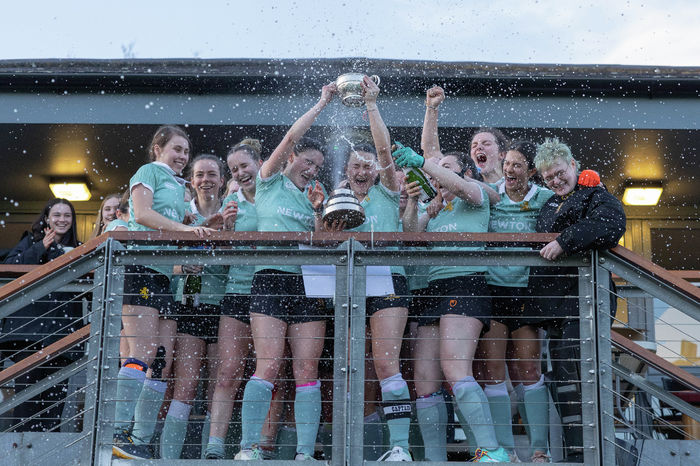The Thames is Light Blue once again
Isabelle Watts gives the run down on Cambridge’s success at the 169th Boat Race

Saturday 30 March saw the Thames play host to the 169th Boat Race and the 78th Women’s Boat Race, as Cambridge and Oxford once again battled their way from Putney to Mortlake in one of the oldest sporting events in the world. Cambridge was vying to defend their spectacular clean sweep last year, when they won every single race: the spares’ races, veterans’ races, both men’s and women’s lightweight races, men’s reserves, women’s reserves, women’s Blue Boat and the men’s Blue Boat.
The spares’ races were held on Wednesday 27 March, where reserve rowers compete in pairs down a stretch of the championship course. The crews battled rough conditions, Cambridge winning both the open weight men and lightweight men spare pair races. The women’s equivalents were combined into a ‘spare four’ at the bequest of Oxford, who went on to win by two lengths.
Friday 29 March saw the lightweight crews take to the river for their races: the lightweight men defeated their Oxford counterparts by over five lengths, and the Cambridge women also won five lengths up from the Dark Blues, defending their victory for the fifth year in a row.
Finally, Saturday arrived and brought with it a bright blue sky and glorious sunshine which drew significant crowds to the banks of the Thames. Furnival Gardens was a sea of light blue, pressuring many of the embarrassed Oxford supporters to keep their heads down.
The women’s Blue Boat race was first. Oxford took an impressively early lead, causing despondence among Cambridge supporters. But the crew were unfazed and relied on their confident base pace to carry them through the course. Halfway through the race, just after Hammersmith Bridge, this base pace took Cambridge past the Oxford crew and quickly put clear water between themselves and the Dark Blues. The plucky Oxford cox Joe Gellett attempted to take advantage of a rule stating that if a bump takes place while one boat is in another boat’s water, the boat on the wrong side is disqualified – he thus ‘bumped’ the Cambridge boat; however, no disqualification took place as Cambridge was not encroaching on Oxford water at the time of contact, and the bump was clearly manoeuvred by Oxford. Cambridge cox Hannah Murphy kept her crew calm as they seemingly coasted to claim victory by seven lengths, an incredible effort by the Light Blues whose celebrations were only marginally delayed by the valiant yet unfruitful appeal of Oxford’s Gellett to umpire Richard Phelps regarding the bump.
As millions tuned in to the BBC coverage from all over the world, the crowds gathered along the course had the extra benefit of watching the two reserve races which took place between the televised Blue Boat races. First came Blondie, the women’s reserve boat, which lost to an impressive performance by Oxford’s Osiris who had gained a lead off the start and did not let it slip. Goldie, the men’s reserves, brought home another victory for Cambridge, finishing the course four lengths ahead of their rivals.
Finally, the men’s Blue Boats came storming down the course. The two crews were level until a clash passing Craven Cottage gave Cambridge an advantage and, coupled with the advantage of the Middlesex bend, this left Cambridge with a lead of one length. They continued to increase this advantage even through the Oxford advantage bend. However, just as a Cambridge victory appeared a foregone conclusion, stroke Matt Edge (St Catharine’s) began to flag, having clearly given his all. He put up a valiant effort and continued moving at race pace, yet it was up to the seven rowers behind him to provide the power and control required to cover the final kilometre of the championship course. Luckily, the gap Cambridge had made between themselves and Oxford was large enough to ensure a win of three and a half lengths, in a time of 18 minutes, 56 seconds.

Heartache and heroism at Varsity hockey matches 2024
The tradition of throwing the victorious cox into the river was banned this year, due to dangerously high levels of E coli bacteria found in the Thames. Oxford claimed that several of their rowers had missed sessions this week due to illness, potentially caused by the bacteria; however, they were adamant that this does not take away from Cambridge’s dominating victory.
After this year’s results, Cambridge leads 87-81 in the men’s races and 48-30 in the women’s races, having won decisively every year since 2017. One wonders whether Oxford can still be considered a worthy opponent – dare I say, it’s almost getting boring.
 Music / The pipes are calling: the life of a Cambridge Organ Scholar25 April 2025
Music / The pipes are calling: the life of a Cambridge Organ Scholar25 April 2025 News / Candidates clash over Chancellorship25 April 2025
News / Candidates clash over Chancellorship25 April 2025 Arts / Plays and playing truant: Stephen Fry’s Cambridge25 April 2025
Arts / Plays and playing truant: Stephen Fry’s Cambridge25 April 2025 Comment / Cambridge builds up the housing crisis25 April 2025
Comment / Cambridge builds up the housing crisis25 April 2025 Interviews / Dr Ally Louks on going viral for all the wrong reasons25 April 2025
Interviews / Dr Ally Louks on going viral for all the wrong reasons25 April 2025





